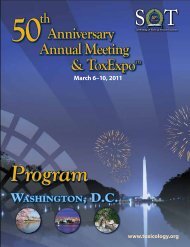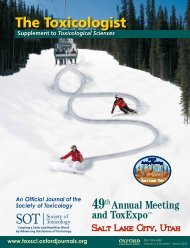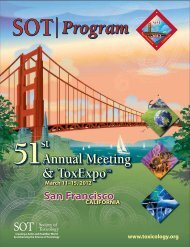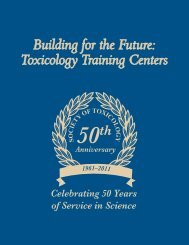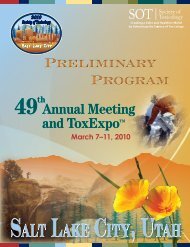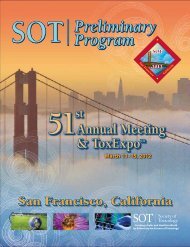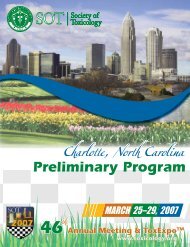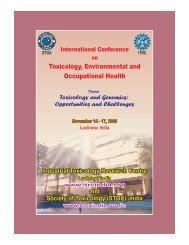Program - Society of Toxicology
Program - Society of Toxicology
Program - Society of Toxicology
Create successful ePaper yourself
Turn your PDF publications into a flip-book with our unique Google optimized e-Paper software.
44 th Annual Meeting<br />
and ToxExpo<br />
<strong>Program</strong> Description<br />
Monday Morning<br />
Monday Morning, March 7<br />
9:30 AM to 11:30 AM<br />
Exhibit Hall A<br />
Monday Morning, March 7<br />
7:30 AM to 3:00 PM<br />
Room 214<br />
UNDERGRADUATE EDUCATION PROGRAM FOR MINORITY<br />
STUDENTS<br />
Chairperson(s): Rosita Proteau, SCMI Chair, Oregon State University,<br />
Corvallis, OR.<br />
Sponsored by:<br />
Education Committee<br />
Education Subcommittee for Minority Initiatives<br />
7:30 AM–8:00 AM Breakfast for Students, Advisors, Peer Mentors,<br />
and SOT Hosts<br />
8:15 AM–9:15 AM Plenary Lecture: Science, Policy, and Regulation<br />
at the White House Office <strong>of</strong> Information and<br />
Regulatory Affairs, John D. Graham, Office <strong>of</strong><br />
Information and Regulatory Affairs, OIRA<br />
9:30 AM–11:30 AM Special Poster Session for Visiting Students<br />
POSTER SESSION FOR VISITING STUDENTS<br />
Chairperson(s): Rosita Proteau, SCMI Chair, Oregon State University,<br />
Corvallis, OR and Javier Avalos, TopTox, Sacramento, CA.<br />
Sponsored by:<br />
Education Committee<br />
Education Subcommittee for Minority Initiatives<br />
This poster session is part <strong>of</strong> the Undergraduate Education <strong>Program</strong> for<br />
Minority Students. All are welcome to view the specially selected presentations<br />
which provide an overview <strong>of</strong> research in toxicology and demonstrate the diversity<br />
within the discipline.<br />
Monday Morning, March 7<br />
9:30 AM to 12:00 NOON<br />
Room RO4<br />
SYMPOSIUM SESSION: THE FUTURE OF MOLECULAR GENETIC<br />
THERAPEUTICS<br />
Chairperson(s): David Monteith, Lilly Research Laboratories, Greenfield, IN<br />
and Vijay Reddy, Lilly Research Laboratories, Greenfield, IN.<br />
MONDAY<br />
11:45 AM–1:00 PM Closing Session<br />
1:00 PM–3:00 PM Evaluation Focus Groups<br />
Monday Morning, March 7<br />
8:30 AM to 9:15 AM<br />
La Louisiane Ballroom<br />
PLENARY LECTURE: SCIENCE, POLICY, AND REGULATION AT<br />
THE WHITE HOUSE OFFICE OF INFORMATION AND<br />
REGULATORY AFFAIRS<br />
Lecturer: John D. Graham, Administrator, Office <strong>of</strong> Management and Budget,<br />
OIRA.<br />
John D. Graham, PhD, is Administrator <strong>of</strong> the Office <strong>of</strong> Information and<br />
Regulatory Affairs within the White House Office <strong>of</strong> Management and Budget.<br />
As OIRA Administrator, Dr. Graham has pursued an agenda <strong>of</strong> “smarter regulation.”<br />
This means that the <strong>of</strong>fice is neither pro-regulation nor anti-regulation.<br />
OIRA seeks to accelerate the adoption <strong>of</strong> sensible rules, modify existing rules<br />
to make them more effective and less costly, and rescind outdated rules whose<br />
benefits do not justify their costs. Under Dr. Graham’s leadership, OIRA has<br />
made changes in many areas to increase the reliance on sound science. These<br />
initiatives include government-wide Information Quality Guidelines, guidance<br />
on Peer Review, and a revised circular on Regulatory Analysis for benefits and<br />
costs <strong>of</strong> regulations. Dr. Graham will talk about these initiatives, other OIRA<br />
activities, and also share with SOT ways in which members <strong>of</strong> the public can<br />
constructively engage in the process <strong>of</strong> bringing sound science to the policy<br />
arena.<br />
Endorsed by:<br />
Comparative and Veterinary SS<br />
Regulatory and Safety Evaluation SS*<br />
Student Advisory Committee<br />
During the last decade the decoding <strong>of</strong> the human genome has provided exciting<br />
possibilities for the treatment <strong>of</strong> human disease. The promise <strong>of</strong> gene therapy<br />
and antisense have stirred the imagination to the potential <strong>of</strong> redirecting<br />
abnormal cellular processes. These therapies provide potential advantages in<br />
specificity to gene targets and selectivity for protein intervention in some<br />
disease targets that are <strong>of</strong>ten considered ‘undruggable’ with traditional<br />
chemotherapies. To date, these technologies have provided interesting technologies<br />
as research tools to gain perspective with respect to effects <strong>of</strong> various<br />
targets; in particular antisense strategies using single-strand and siRNA provide<br />
tools to validate molecular targets in disease pathways. These antisense<br />
approaches utilize different mechanisms (i.e., RISK complex and RNase H) to<br />
reduce a target protein in a manner not achievable with a small molecule<br />
approach. Gene therapy has posed the potential to treat and possibly cure disease<br />
by replacing lost function with the insertion <strong>of</strong> a normal gene. Currently, there<br />
are numerous antisense and gene therapy clinical candidates in development by<br />
corporate sponsors as well as academic centers and investigators. The selection<br />
<strong>of</strong> disease candidates and targets is complex. The administration, delivery, cell<br />
permeability, and pharmacokinetic and pharmacodynamic attributes have<br />
played a critical role in the development <strong>of</strong> these therapies. This symposium will<br />
cover the biologic and safety hurdles these therapies have faced and the solutions<br />
that have been developed to evaluate these molecules in patients. The<br />
symposium will consist <strong>of</strong> an expert panel <strong>of</strong> presenters involved in the science<br />
and development issues surrounding molecular genetic therapies.<br />
#13 9:30 THE FUTURE OF MOLECULAR GENETIC<br />
THERAPEUTICS. D. Monteith and V. Reddy. Eli Lilly<br />
and Company, Greenfield, IN.<br />
#14 9:40 GENE THERAPY: A SIMPLE CONCEPT WITH<br />
COMPLEX CHALLENGES. R. M. Lyons. Self-<br />
Employed, Gaithersburg, MD.<br />
up-to-date information at www.toxicology.org 49



